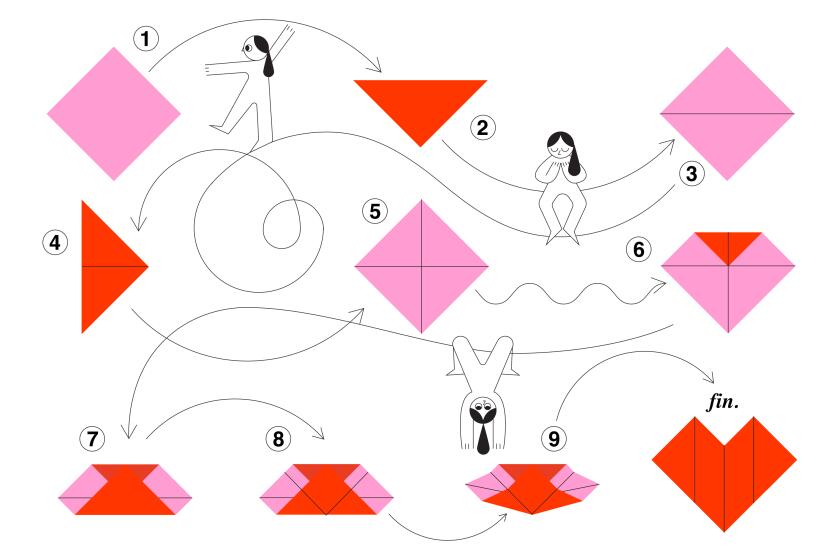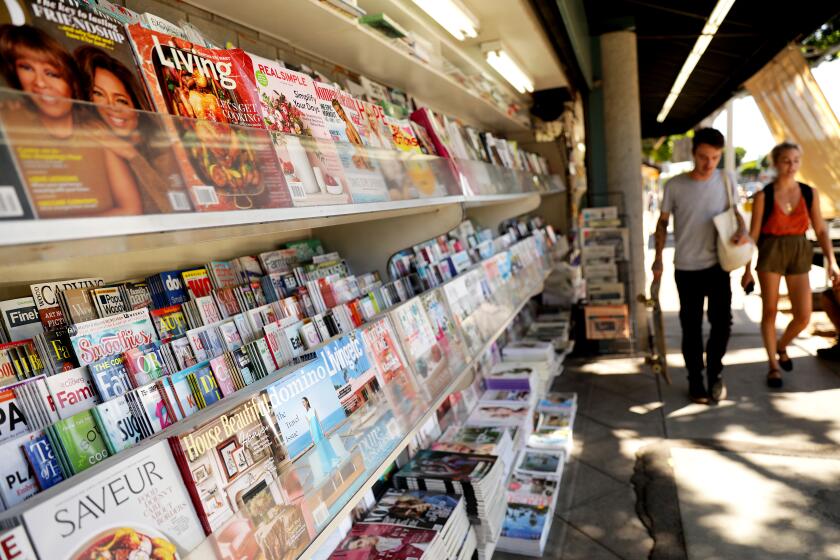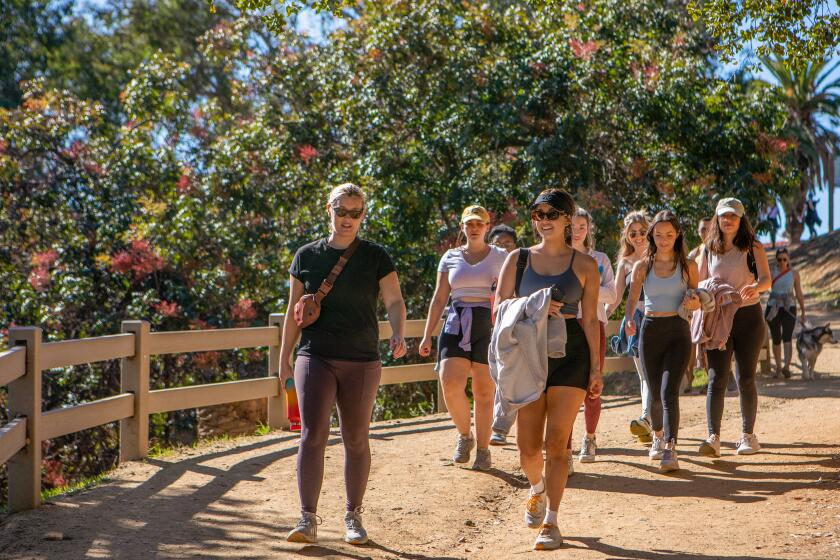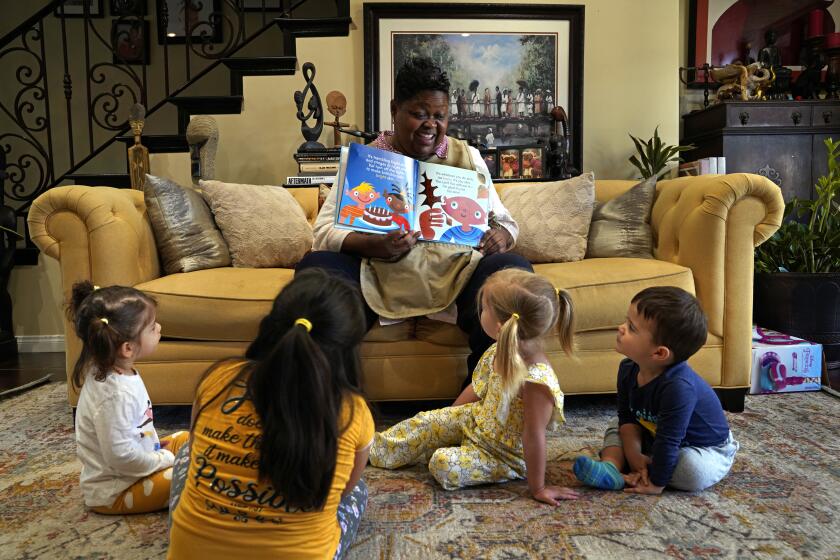Can’t afford therapy? Try these mental health care alternatives

- Share via
Valentine’s Day is all about celebrating love. And no one deserves love more than you.
Sure, traditionally, the holiday is for showering your significant other with tokens of your affection. But — to paraphrase the immortal words of RuPaul — if you can’t love yourself, how are you going to love somebody else?
Searches for “self-love” spike every February, according to the Google Trends newsletter, and searches for “self-care” have reached an all-time high this month.
Self-care can look like indulging or pampering. If you want to celebrate yourself with a bubble bath or a massage, go for it.
But self-care can also look like taking care of your mental health.
Therapy is great, but it’s usually pricey. And it can be challenging to navigate the process of finding a therapist who’s accepting new clients and takes your insurance when you’re already dealing with mental health challenges.
So here are some ways to improve your mental health that cost less than an out-of-pocket doctor visit.
I make origami hearts to mark healthy choices and improve my mental health. When I fold, I feel freer. I focus on my moving hands instead of my racing thoughts.
Meditate, journal, read
Yes, “have you tried meditation and journaling” is practically a cliche at this point. But there’s a reason people keep suggesting it: It’s free, easy to start doing and backed by evidence that it works.
Meditate. Even just a few minutes of closing your eyes and taking deep breaths can be beneficial. The app Headspace is free for L.A. County residents (and has 14-day free trials for everyone else). Calm and the Peloton app offer guided meditations to paid subscribers after a free trial. The Insight Timer, Mindfulness Coach and Healthy Minds Program apps are all highly rated and free. You can also find free guided meditations on Spotify and YouTube.
Journal. Writing down your thoughts and feelings is a powerful way to ground yourself and get in touch with your emotions. Like meditating, there are tons of free ways to start journaling right this minute. Apps like Day One offer free journaling on your phone if you’re not a pen-and-paper person.
Read. Bibliotherapy is its own sub-discipline of therapy. But you don’t necessarily need a licensed bibliotherapist to tell you where to start. Some popular titles: “Wherever You Go, There You Are” by Jon Kabat-Zinn, “The Feeling Good Handbook” by David Burns, “The Courage to Heal” by Ellen Bass, “Overcoming Depression” by Lawrence Shapiro.
You can use your Los Angeles Public Library card to get free access to the New York Times, the Wall Street Journal, the Economist and more.
Get outside
The sun is an underrated mental health resource. Getting outside is good for your brain as well as your body.
Hike, try forest bathing or a sound bath, or take an in-person meditation class. Find more information on mindfulness and meditation activities here.
Call a hotline or warmline
Hotlines and warmlines offer general support as well as specific help for LGBTQ+ people, people of color, people who’ve experienced abuse or sexual violence, teens, veterans, and other groups. Hotlines are typically for people experiencing a crisis. Warmlines let you chat or vent about anything that’s on your mind.
The California Peer-Run Warm Line is available 24 hours a day, seven days a week to California residents. You can talk with a peer counselor and get mental and emotional support for any non-emergency issue, including relationship problems, anxiety, depression, finances or substance abuse. Call or text (855) 845-7415 or click “online chat” on the warmline’s website.
If you are currently experiencing a mental health crisis, there are free phone- and text-based ways to get help. The 988 Suicide & Crisis Lifeline is available by dialing 988. It is available for Spanish speakers at (888) 628-9454 and for deaf or hard of hearing people online (or via TTY). If you can’t or don’t want to talk with someone on the phone, the Crisis Text Line has crisis counselors available via text (send “HOME” to 741741) and via WhatsApp.
Find more information on crisis hotlines and nonemergency warmlines here.
When she moved to Los Angeles, Monica Figueroa launched L.A. Girls Who Walk for women finding it hard to make friends and find healthy ways to hang out.
Try in-person or virtual support groups
The National Alliance on Mental Illness of Greater Los Angeles County and associated chapters throughout the region (including the San Fernando Valley, Glendale, the San Gabriel Valley, the Pomona Valley, the South Bay) offer free peer support groups over Zoom led by trained facilitators for people living with mental illness or their family members.
SHARE! Self-Help and Recovery Exchange has a regularly updated calendar of free volunteer-run support groups, including ones that meet on Zoom or in person in Culver City and downtown Los Angeles. Group topics include substance abuse, codependency, addiction, grief and loss, anger management and a variety of mental health conditions.
There are a number of identity-specific support groups out there, including BEAM: Black Emotional and Mental Health Collective, the Los Angeles LGBT Center, Our House Grief Support Center, GriefHaven and Springs of Hope Grief-Care Center.
Seek out trained peer support
L.A. County offers 24/7 peer support for free through the iPrevail platform. You must be in L.A. County to register for the free account. Other cities and counties also offer free or subsidized iPrevail support; if your area doesn’t, it’s $9.99 a month.
7 Cups offers free peer support 24/7 with an option to upgrade to a licensed therapist for $150 a month.
From rustic roadside holes in the ground to luxurious Napa Valley retreats, here’s where to take a soak.
Find cheaper alternatives to traditional therapy
Through work, school or your place of worship. Check with your employer to find out whether your job offers an Employee Assistance Program. These programs often cover several free sessions with a counselor. If you’re a student, inquire about a school counselor. Sessions with an EAP or school counselor are subject to standard confidentiality constraints — in other words, the person you talk with won’t go to your boss or parents and tell them what you talked about. Many churches, temples and other places of worship offer confidential support and counseling for free, even if you aren’t a regular member.
Through lower-cost resources. Sliding-scale clinics, graduate schools and teaching hospitals all may offer talk therapy at a more palatable price. Here’s more information on free and sliding-scale clinics in and around L.A. and Orange counties.
Through apps. Your insurance may cover therapy sessions through apps like Talkspace, Cerebral and BetterHelp.
Through 211. Calling 211 from anywhere in America will connect you to someone knowledgeable about your local resources for all sorts of things, including mental health, rent and mortgage assistance, transportation, child and elder care and job training. 211 is available 24/7 in California. Call 211 and ask what your local government offers for mental health needs.
A list of crisis hotlines, low-fee and sliding scale counseling, support groups, and mindfulness and meditation services
More to Read
Sign up for The Wild
We’ll help you find the best places to hike, bike and run, as well as the perfect silent spots for meditation and yoga.
You may occasionally receive promotional content from the Los Angeles Times.
















